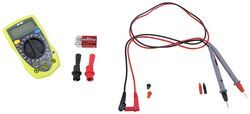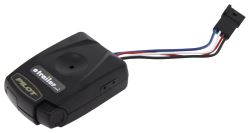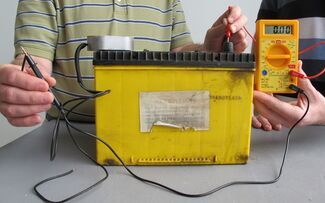
Troubleshooting OL Error Message on Hidden Hitch Brake Controller # 80550 on 2007 Chevrolet 4WD 3500
Question:
When I jack up the trailer 2 axles so the tires are off the ground, the brakes work fine. Then, when put tires back on ground, I get the OL code. Any ideas? I have a 2007 Chevy 3500 classis 4WD.
asked by: Boomer B
Expert Reply:
An OL error message on your brake controller indicates an overload error which could be caused by a bad ground or a short in the blue brake output wire. It sounds like the position of the wiring could be changed when the trailer is jacked up. Due to this, a nicked or loose wire may be touching the frame or some other metal component when the trailer is not jacked up so be sure to check the wires to ensure there are no broken or nicked spots.
If the issue still exists, you will want to check the connector at the back of your 2007 Chevrolet Silverado 3500 4WD to ensure the connection is free of dirt, moisture, or corrosion. This would cause a bad ground or short to the brake output pin. If this is the case, you will want to clean the connector and it is a good idea to clean out the connector on the trailer side.
You may also have a bad ground from the brake controllers white ground wire to the ground point. Check for corrosion and, if it exists, clean it out and re-attach the ground. Check all these factors on the trailer side as well.
Another potential issue could be the electric brake magnets on the trailer. They may be worn out or not working properly. You can check the magnets and if you see any of the windings, they are worn out and will need to be replaced. To test the magnets, use a mulitmeter such as the Buffalo Tools Multimeter # PT89ZR. I am also including a link to an FAQ article on testing trailer brake magnets.
I have also included a link to the installation instructions to the brake controller.

Products Referenced in This Question
Digital Multimeter with 42" Long Test Leads - LED Display
- Electrical Tools
- Testers
- Multimeter
- Yellow
- Performance Tool
more information >
Product Page this Question was Asked From
Pro Series Pilot Trailer Brake Controller - 1 to 3 Axles - Time Delayed
- Trailer Brake Controller
- Time Delayed Controller
- Electric
- Automatic Leveling
- Under-Dash Box
- Dash Mount
- Up to 3 Axles
- Digital Display
- Up to 360 Degrees
- Pro Series
more information >
Featured Help Information
Instructions
Miscellaneous Media

Continue Researching
- Q&A: Replacement For TDE LP75 Disc Brake Actuator
- Article: Brake Controller 7- and 4-Way Installation Kit (ETBC7)
- Article: Towing a Trailer? Let's Talk About Brake Controllers
- Q&A: Can I Weld on a Bolt on Brake Actuator?
- Q&A: Weight Capacity and How Dexter DX7.5L Brake Actuator Installs on Trailer Frame
- Article: How to Choose the Right Trailer Hitch Class
- Article: Brake Controller Installation: Starting from Scratch
- Article: Enjoy The 2024 Eclipse With Harvest Hosts
- Q&A: Replacement Options for Apollo AAC24BIB with Furrion RV Microwave 13.5K watt/0.9 Cu Ft.
- Q&A: Replacement Trailer Grease Seals for Allis 5013 29772
- Q&A: Parts Needed to Install the Prodigy P3 Brake Controller on a 2024 Honda Pilot
- Q&A: What Is Needed To Safely Flat Tow A 2023 Chevy Silverado 1500
- Article: Parts Needed to Add Electric Drum Brakes to a Trailer
- Article: The 5 Best Trailer Drop Hitches You Can Buy







